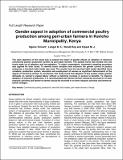| dc.contributor.author | Ngeno Vincent, BK Langat, Wendi Rop, MJ Kipsat | |
| dc.date.accessioned | 2020-08-14T07:22:44Z | |
| dc.date.available | 2020-08-14T07:22:44Z | |
| dc.date.issued | 2011-07-30 | |
| dc.identifier.uri | https://repository.maseno.ac.ke/handle/123456789/2103 | |
| dc.description.abstract | The main objective of this study was to assess the extent of gender effects on adoption of intensive commercial poultry production system by peri-urban farmers. The sample frame was divided into two strata made up of adopters and non-adopters. To select respondents, systematic sampling procedure was applied for both strata. To identify those variables that influence the gender control of poultry enterprise, a two-limit tobit model was used. The results from the two-limit tobit model identified three variables: production system, education and employment of woman as significant determinants of the degree of control by women. In conclusion, this study found that adoption of this system makes greater demands on women’s unpaid labour without a matching increase in access to benefits. To improve adoption of intensive production, it is recommended that women-farmers should be involved in on-farm research activities and farmer-to-farmer should be involved in on-farm research activities and farmer-to-farmer linkages. | en_US |
| dc.publisher | Academic Journals | en_US |
| dc.subject | Commercial poultry production, two-limit tobit model, peri-urban farmers, Kenya. | en_US |
| dc.title | Gender aspect in adoption of commercial poultry production among peri-urban farmers in Kericho Municipality, Kenya | en_US |
| dc.type | Article | en_US |

